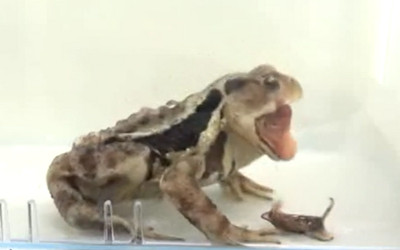(单词翻译:单击)
听力文本
This is Scientific American — 60-Second Science. I'm Karen Hopkin.
If you're a fan of nature shows, you've probably heard of the bombardier beetle. When disturbed, this weaponized insect can spray a boiling hot jet of noxious chemicals from its hind end—a response that even the hungriest predators find highly off-putting.
But what if that predator is so stealthy and quick that the beetle doesn't have time to deploy its signature defense before it gets 'et? Turns out, the explosion is also effective when detonated from the inside. We know this because a new study shows that the bombardier beetles can use their chemical weapons to escape from the belly of the toad that ate them. They accomplish this Jonah-like feat by using their chemical cocktail to encourage the amphibian to barf them back up. The finding is served up in the journal Biology Letters.
Researchers collected 37 beetles and 37 toads from a forest in Central Japan. Some of the toads, those of the species Bufo japonicas, share their territory with the bombardier beetles. Others, the Bufo torrenticola, inhabit the nearby streams and don't normally encounter these feisty bugs.

Back in the lab, the researchers paired off their collected specimens and each toad was allowed to capture and swallow a single beetle. And then came the fireworks. As the authors note in their paper: "an explosion was audible inside each toad." Which means that somewhere along the alimentary canal, the beetles dropped their bombs.
What happened next depended on the participants. About 35 percent of the japonicas toads, who presumably were familiar with the beetles, spit the critters back up. While 58 percent of the stream toads gave the researchers valuable feedback, literally—they upchucked, too.
As for the bugs, the larger ones were more likely to make it back out. The lucky ones escaped in under 15 minutes. And those less fortunate were in there up to an hour and a half. And though they emerged covered in mucus, all 16 vomited beetles returned alive and were able to walk away. Fifteen of them were still kicking two weeks later. And one survived to tell his tale for another a year and a half.
And it was largely their emetic emissions that saved them. Bugs who were prodded into depleting their chemical arsenals before they got eaten were never seen—or heard from—again. The authors note that "no toads died as a result of swallowing beetles." But after their contribution to science, they probably avoided hot sauce.
Thanks for listening for Scientific American — 60-Second Science. I'm Karen Hopkin.
参考译文
这里是科学美国人——60秒科学。我是凯伦·霍普金。
如果你爱看自然节目,你可能听过放屁虫。在受到干扰时,这种武装起来的昆虫可以从尾部喷射出灼热的有毒化学物质,这种反应甚至连最饥饿的捕食者都会极其厌恶。
但是,如果捕食者特别隐蔽又迅速,以致于甲虫来不及部署独特防御就被吃掉了呢?结果发现,甲虫内部同样可以引发爆炸。我们知道这一点,是因为一项新研究发现,放屁虫可以利用它们的化学武器,从吃掉它们的蟾蜍肚子里逃走。它们用自己的化学混合物刺激蟾蜍,迫使其将它们吐出来,完成这一约拿式的壮举。这项研究结果发表在《生物学快报》期刊上。
研究人员从日本中部的一座森林中收集了37只甲虫和37只蟾蜍。有些蟾蜍属日本蟾蜍,与放屁虫生活在同一领地。其他蟾蜍则为湍蟾蜍,生活在溪流附近,通常不会遇到这些易怒的虫子。
回到实验室以后,研究人员将收集到的样本进行配对,让每只蟾蜍捕获并吞下一只甲虫。然后出现了惊人的现象。正如作者在论文中记述的那样:“我们听见每只蟾蜍体内都发生了爆炸。”这表明甲虫在蟾蜍消化道的某个位置引爆了炸弹。
之后会发生什么取决于参与者。据推测在熟悉甲虫的日本蟾蜍中,有大约35%会把甲虫吐出来。虽然58%的湍蟾蜍为研究人员提供了有价值的反馈,但它们也会将甲虫吐出来。
至于甲虫,体型较大的甲虫更可能被吐出来。幸运的甲虫在15分钟之内就会逃脱。而那些不太走运的甲虫则最多要待一个半小时。尽管被粘液包裹,但16只被吐出来的甲虫成功生还,而且还能行走。其中15只甲虫在两周后依然充满活力。1只甲虫甚至又活了一年半。
主要是催吐行为保住了这些甲虫的生命。那些在被吃掉前因受刺激而耗尽化学武器的虫子,再也没被看到或听到过。作者指出,“没有蟾蜍因吞下甲虫而死。”但是在它们为科学研究做出贡献以后,它们很可能会躲避辣椒酱。
谢谢大家收听科学美国人——60秒科学。我是凯伦·霍普金。
译文为可可英语翻译,未经授权请勿转载!
重点讲解
重点讲解:
1. pair off (使)成对儿,(使)成双;
The squad members paired off to find places to eat and sleep.
小组成员结对儿找地方吃饭睡觉。
2. be familiar with 熟悉;熟知;
We're familiar with the geography of New England.
我们熟悉新英格兰的地形。
3. be likely to do sth. 可能(做…)的;有(…)倾向的;
The matter is likely to go to arbitration.
这件事很有可能要提请仲裁。
4. walk away 脱身;一走了之;
He says the force of the blast collapsed his shop while he was standing inside but he managed to walk away.
他说,炸弹的爆炸力震毁了他的商店,当时他在正站在店里,不过逃了出来。


